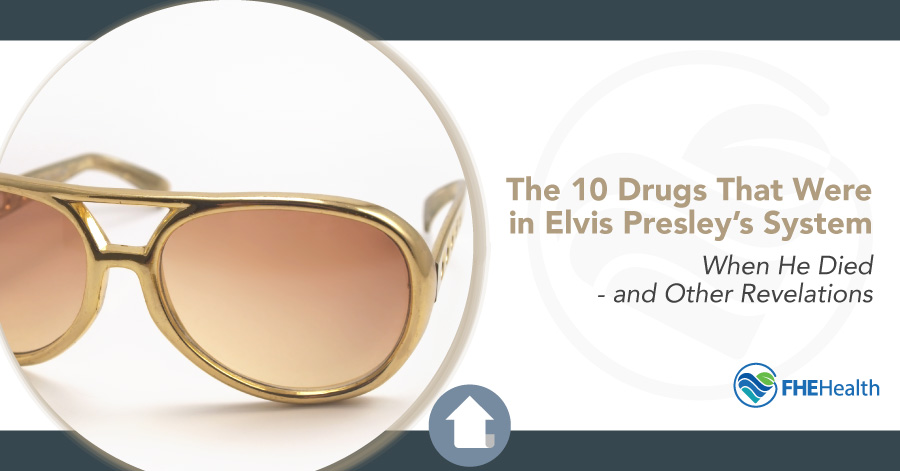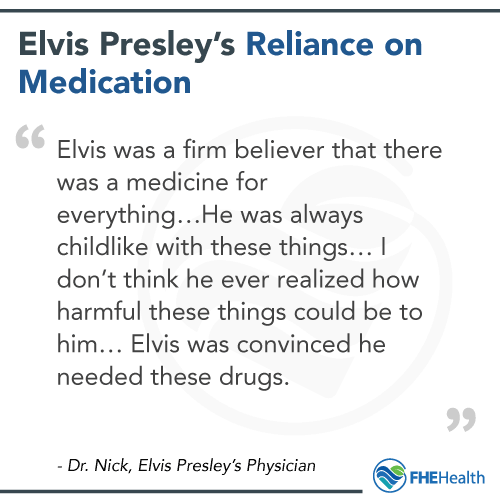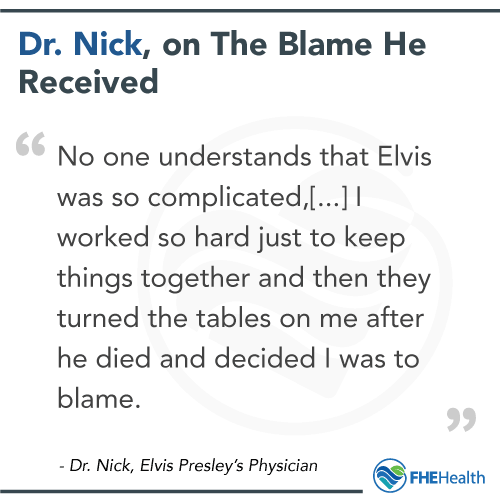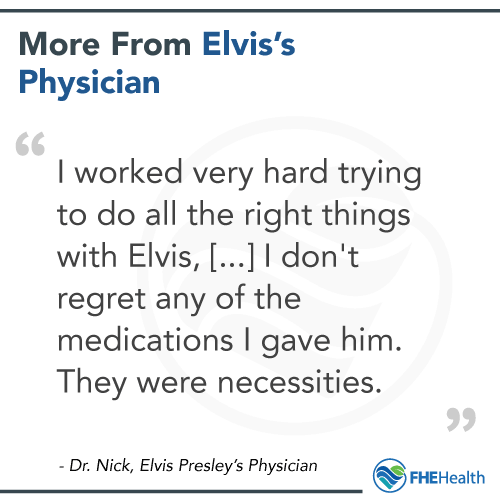
It has been over 40 years since Elvis Presley’s death in 1977, but in many ways, his legend lives on. Elvis was a musical and cultural icon who will never truly die from a societal standpoint, and his influence is not easily forgotten.
While Elvis is best known for his musical and acting performances, there is much to be learned from the nature of his death as well. Despite an apparent belief that he was not a drug abuser, drug use played an unfortunate role in the unraveling of his career and his ultimate untimely death. From the cocktail of drugs in his system at the time of his death to the actions of his physician in the last few months of his life, Elvis’ death informs many realities of modern addiction.
A lot of knowledge has been left behind in the King’s legacy, from learning what drugs Elvis did to what his story reveals about the nature of physician-supported addiction.
The 10 Drugs in Elvis Presley’s System
On August 16, 1977, Elvis Presley was found dead on his bathroom floor in Memphis, Tennessee. Despite his physician’s insistence and the assertions of the original medical examiner that drugs played no role in his death, later examination revealed this was absolutely not the case. Through his toxicology reports, medical examiners found that he actually had traces of 14 drugs in his system, 10 of which were present in significant quantities.
These primary 10 substances include:
- Codeine: Codeine is a prescription pain medication that is used to address moderate pain. Today, it’s often found in prescription cough medication.
- Morphine: A potent form of opiate, morphine is a highly controlled substance that is both addictive and dangerous when used without supervision.
- Methaqualone: Methaqualone is a barbiturate-like sedative and hypnotic medication that is more commonly known by its brand name, Quaalude. This central nervous system depressant was popular for recreational use in the 1970s and 1980s.
- Diazepam: Better known as Valium, diazepam is a benzodiazepine commonly used for conditions like anxiety and insomnia.
- N-Desmethyldiazepam: More commonly referred to as nordazepam, this benzodiazepine can be used for anxiety, insomnia and seizures. Today, it is a less common choice than other benzodiazepine forms.
- Ethinamate: Another hypnotic and sedative medication, ethinamate is a carbamate derivative that can be highly addictive.
- Ethclorvynol: Sold under the name Placidyl, ethclorvynol was a GABA-ergic sedative and hypnotic medication popular in the mid-1990s for treating insomnia. Today, Placidyl is no longer available in the US due to dwindling demand in favor of safer and more effective alternatives, but it can still be found in other countries.
- Pentobarbital: Pentobarbital is a short-acting barbiturate that can cause sedative side effects.
- Phenobarbital: A barbiturate similar to pentobarbital, phenobarbital is a short-term drug used to treat anxiety, insomnia and seizures.
- Butabarbital: Butabarbital is a barbiturate used to treat insomnia and anxiety disorders.
 A high number of the drugs found in Presley’s system were either barbiturates or benzodiazepines. These kinds of drugs are very addictive and should never be mixed.
A high number of the drugs found in Presley’s system were either barbiturates or benzodiazepines. These kinds of drugs are very addictive and should never be mixed.
The Lethal Impact of Prescription Drug Overuse
As demonstrated in his death, significant doses can result in depression of the nervous system to the point that suppressed breathing and heart rate can be fatal. Further, the amount of codeine found in his body alone was over 30 times higher than the recommended dose.
All of the drugs found during autopsy are prescription medications rather than street drugs like heroin.
While it’s not impossible to purchase these kinds of medications illegally, especially for a celebrity with deep pockets, evidence indicates that Presley was offered many of these medications legally.
 In retrospect, the role of drugs was obvious in Presley’s death, despite his doctor’s efforts to cover up his abuse and his odd stance as
In retrospect, the role of drugs was obvious in Presley’s death, despite his doctor’s efforts to cover up his abuse and his odd stance as  However, in 1977, the connections between safe medications provided by a doctor and more dangerous street drugs were a little less obvious. As such, many of the safeguards in place today to catch doctors running pill mills didn’t exist at the time of Presley’s death. However, that doesn’t mean doctors weren’t well aware of some of the dangers of both overprescribing and mixing medications.
However, in 1977, the connections between safe medications provided by a doctor and more dangerous street drugs were a little less obvious. As such, many of the safeguards in place today to catch doctors running pill mills didn’t exist at the time of Presley’s death. However, that doesn’t mean doctors weren’t well aware of some of the dangers of both overprescribing and mixing medications.





